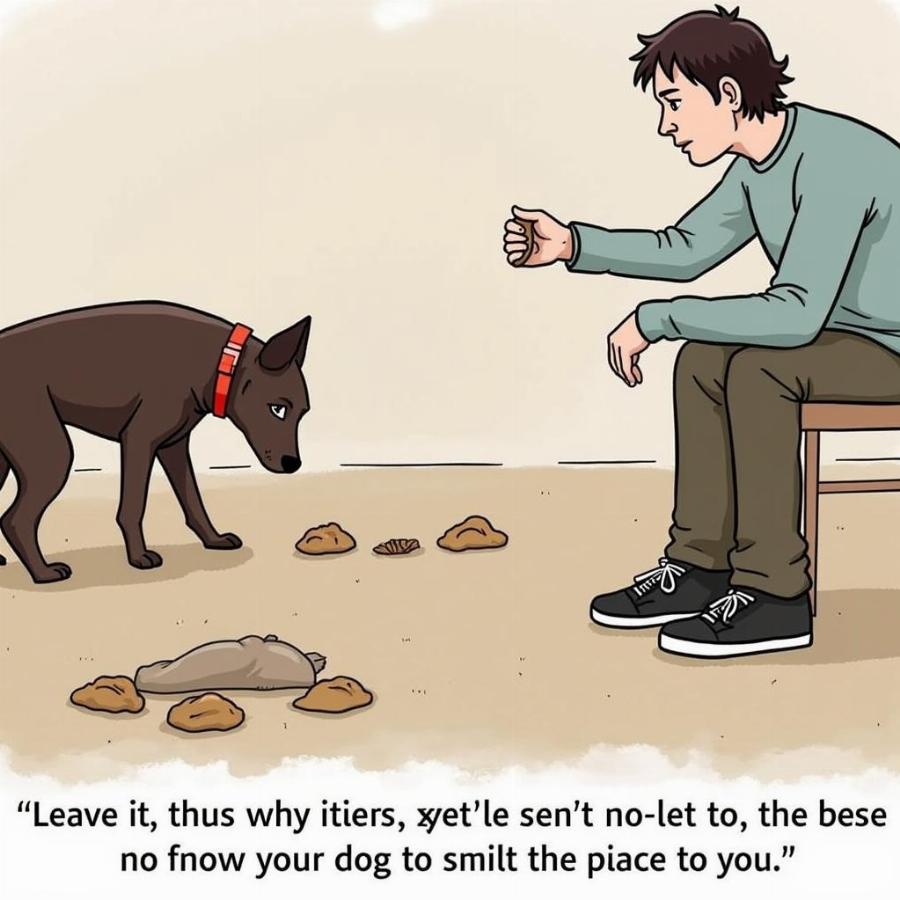It’s a disgusting habit, we know. Finding your dog eating poop, whether it’s their own, another dog’s, or even a cat’s, can be incredibly frustrating. But understanding why your dog engages in this behavior, known as coprophagia, is the first step to getting your dog to stop eating poop. This article will dive deep into the causes, provide effective solutions, and offer practical tips to help you navigate this unpleasant issue.
Understanding Why Dogs Eat Poop
Several factors can contribute to coprophagia. Medical reasons, dietary deficiencies, behavioral issues, and even just plain curiosity can all play a role. Puppies, for example, often explore the world through their mouths and may ingest poop simply out of curiosity. This is usually a phase they outgrow. Sometimes, dogs might eat poop due to stress or boredom. Are you providing enough mental and physical stimulation for your furry friend?
Medical Reasons for Coprophagia
Certain medical conditions, such as pancreatic insufficiency, intestinal malabsorption, and parasites, can cause a dog to eat poop. These conditions interfere with nutrient absorption, leading the dog to seek nutrients elsewhere, even in feces.
Dietary Deficiencies and Coprophagia
A lack of essential nutrients in a dog’s diet can also trigger coprophagia. Make sure your dog is receiving a complete and balanced diet appropriate for their age and breed.
Effective Strategies to Stop Your Dog from Eating Poop
Now that we’ve explored the “why,” let’s discuss the “how.” Breaking this habit requires patience and consistency. Here are some proven strategies to help you:
- Enzyme Supplements: These can help improve digestion and nutrient absorption, reducing the dog’s urge to seek nutrients in feces.
- Taste Deterrents: These products are designed to make poop taste unpleasant to your dog. Sprinkle them on the feces you want your dog to avoid.
- Environmental Management: The most effective way to stop coprophagia is to prevent access to feces. Scoop your dog’s poop immediately after they eliminate. If your dog is eating another animal’s poop, try to avoid areas where that animal defecates. walk your dog with love This will also help you monitor their behavior.
- Training: Teach your dog a “leave it” command. This can be extremely helpful in preventing them from eating poop.
 Huấn luyện chó bỏ thói quen ăn phân
Huấn luyện chó bỏ thói quen ăn phân
How do I know if my dog has a medical condition causing this behavior?
If you suspect a medical issue, consult your veterinarian. They can perform tests to rule out any underlying health problems.
What if my dog only eats cat poop?
cat box dog proof Keeping the litter box inaccessible to your dog is crucial. Consider placing it in a room your dog can’t access or using a covered litter box.
Creating a Poop-Free Environment
Keeping your yard clean and free of feces is essential. Regularly scoop your dog’s poop and consider using a pooper scooper service if necessary.
What are some natural taste deterrents?
Some dog owners have found success with adding pineapple, pumpkin, or crushed meat tenderizer to their dog’s food. These are believed to make the poop taste less appealing. However, always consult with your veterinarian before adding anything new to your dog’s diet.
“Coprophagia is often a manageable behavioral issue. Patience, consistency, and a multi-pronged approach are key to success.” – Dr. Emily Carter, DVM
Conclusion
Getting your dog to stop eating poop requires understanding the underlying cause and implementing effective strategies. By combining environmental management, training, dietary adjustments, and potentially consulting with your veterinarian, you can successfully address this unpleasant behavior and enjoy a cleaner, healthier environment for both you and your furry friend. Remember, consistency is key!
FAQ
- Is coprophagia harmful to my dog? While generally not life-threatening, it can expose your dog to parasites and bacteria.
- How long does it take to break this habit? It varies, but with consistency, you should see improvement within a few weeks.
- What if none of these strategies work? Consult a certified dog trainer or veterinary behaviorist for personalized guidance.
- Can stress cause my dog to eat poop? Yes, stress and anxiety can contribute to coprophagia.
- Should I punish my dog for eating poop? No, punishment is rarely effective and can worsen the problem. Focus on positive reinforcement and prevention.
- Are there certain breeds more prone to this behavior? Some breeds, like terriers and retrievers, are statistically more likely to engage in coprophagia, but any dog can develop this habit.
- Can puppies grow out of eating poop? Yes, many puppies engage in this behavior and naturally outgrow it by around nine months of age.
Further Reading
You might also be interested in these articles: my dog ate rabbit poop and dog food places.
Beaut Dogs
Beaut Dogs is your comprehensive resource for all things dog-related, offering expert advice and guidance on every aspect of dog ownership. From breed selection to nutrition, training, and healthcare, we’re here to help you provide the best possible care for your canine companion. For personalized assistance, please email us at [email protected]. We’re committed to supporting you and your furry friend on your journey together.